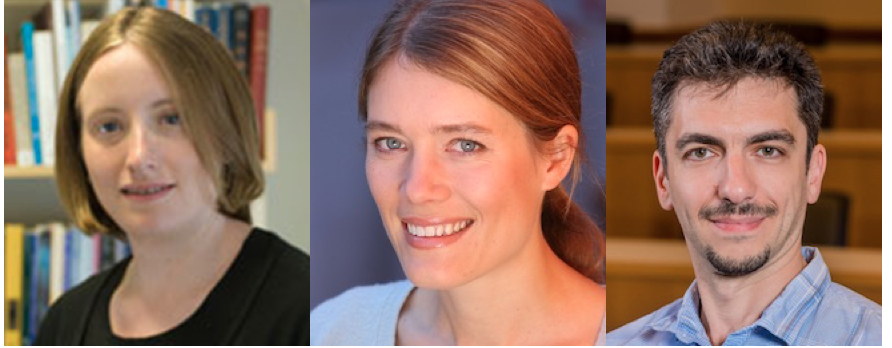
Three IDSS Faculty Awarded Promotions
IDSS is delighted to share that three faculty members have been promoted to the rank of full professor, effective July 1, 2021: Noelle Selin and Jessika Trancik, core members of IDSS, and Alexander (Sasha) Rakhlin, BCS and IDSS core faculty member.
Noelle Selin came to MIT in 2007 as a Postdoctoral Associate at the Center for Global Change Science after completing her PhD at Harvard in Earth and Planetary Sciences. She joined the Engineering Systems Division (ESD) as an Assistant Professor in 2010 with a joint appointment in Earth, Atmospheric and Planetary Sciences (EAPS). Previously, she was a research associate with the Initiative on Science and Technology for Sustainability at Harvard’s Kennedy School, a visiting researcher at the European Environment Agency in Copenhagen, Denmark, and worked on chemicals issues at the U.S. Environmental Protection Agency. Her research uses modeling and analysis to inform sustainability decision-making, focusing on issues involving air pollution, climate change and hazardous substances such as mercury. Professor Selin is also affiliated with the MIT Joint Program on the Science and Policy of Global Change and the MIT Center for Environmental Health Sciences and is Director of MIT’s Technology and Policy Program.
Jessika Trancik received her PhD from the University of Oxford in 2002 as a Rhodes Scholar. She then spent two years as an Earth Institute Fellow at Columbia University, after which she went to the Santa Fe Institute (SFI) as an Omidyar Fellow for three years. Her research examines the dynamic costs, performance, and environmental impacts of energy systems to inform climate policy and accelerate beneficial and equitable technology innovation. Her projects focus on all energy services including electricity, transportation, heating, and industrial processes. This work spans solar energy, wind energy, energy storage, low-carbon fuels, electric vehicles, and nuclear fission among other technologies. She is currently an external professor at the Santa Fe Institute, and was formerly at Columbia University’s Earth Institute, and at WSP International/UNOPS (now Interpeace) in Geneva.
Alexander Rakhlin received a PhD from MIT in 2006. Following an appointment as a postdoc at the University of California at Berkeley, he joined the faculty as an assistant professor at the University of Pennsylvania in 2009 with an appointment in the Department of Statistics at the Wharton School, and was promoted to associate professor with tenure in 2015. After spending a year as a visiting professor in the MIT Statistics and Data Science Center, he joined the Department of Brain and Cognitive Sciences as an associate professor with tenure as well as the Institute for Data, Systems, and Society as a core faculty member. A major thrust of his research is in developing theoretical and algorithmic tools for online prediction, a method of machine learning that processes information provided in a sequential fashion. He has also developed a detailed analysis of statistical complexity of neural networks, offering insight into recent advances in deep learning.


